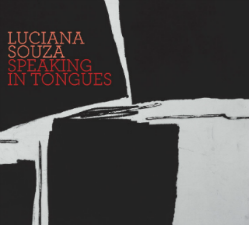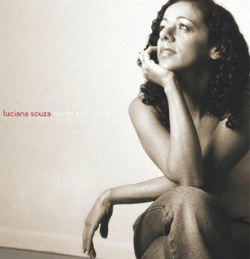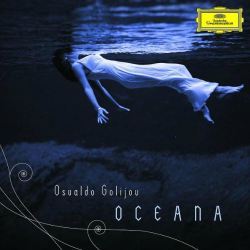Like Ray Charles, Sarah Vaughan, and Bobby McFerrin, Luciana Souza retains her unique identity regardless of the type of music she sings. Her range is staggering. She is a remarkable improviser with recordings that pair her with the most progressive musicians in jazz today. She is also an exquisite interpreter of pop songs, both classic and contemporary, offering definitive renditions of songs as varied as “Never Let Me Go”, “Waters of March” and “The Very Thought of You”. Her three albums of “Brazilian Duos” introduced great songs from Souza’s native land to American audiences by setting her expressive voice against solo guitar accompaniments by Romero Lubambo, Marco Pereira, Toninho Horta, Guilherme Monteiro, Swami, Jr. and her father, Walter Santos. She is also one of the premier interpreters of the music of the contemporary classical composer Osvaldo Golijov, performing his dramatic and vocally challenging music with orchestras and choruses around the world. She has written her own compositions with original words and music, and has also set the poetry of Elizabeth Bishop, Pablo Neruda and Leonard Cohen to her own melodies.
Her range is staggering. She is a remarkable improviser with recordings that pair her with the most progressive musicians in jazz today. She is also an exquisite interpreter of pop songs, both classic and contemporary, offering definitive renditions of songs as varied as “Never Let Me Go”, “Waters of March” and “The Very Thought of You”. Her three albums of “Brazilian Duos” introduced great songs from Souza’s native land to American audiences by setting her expressive voice against solo guitar accompaniments by Romero Lubambo, Marco Pereira, Toninho Horta, Guilherme Monteiro, Swami, Jr. and her father, Walter Santos. She is also one of the premier interpreters of the music of the contemporary classical composer Osvaldo Golijov, performing his dramatic and vocally challenging music with orchestras and choruses around the world. She has written her own compositions with original words and music, and has also set the poetry of Elizabeth Bishop, Pablo Neruda and Leonard Cohen to her own melodies.
However, there is more to Souza’s art than just the mastery of diverse styles. Souza brings deep passion to everything she sings. She picks her repertoire carefully, and is meticulous about finding the right tempo and setting to properly transmit a song’s message. Her recording of “All of Me” sounds like a total act of romantic submission, and her setting of Neruda’s “Tonight I Can Write” conveys a feeling of loneliness and release. She clearly enjoys the rapid-fire lyrics of “Adeus America” but still communicates the subtext of a singer being pulled in two directions. Throughout the “Brazilian Duos” albums, she demonstrates an ability to effectively relay a song’s message even without providing a full English translation of the Portuguese lyrics. On her stunning version of “Never Let Me Go” (embedded below) she stretches the words like taffy. Over the steady slow pulse of the rhythm section, she subtly alters the relationships of the melody and lyrics to the harmony. And when there are no words—either in written passages or an improvised scat solo—Souza brings a strong emotional context to the music, telling her story like a great instrumentalist.
“Never Let Me Go” (Jay Livingston/Ray Evans)
|Luciana Souza (vocals); Edward Simon (piano); Scott Colley (bass); Clarence Penn (drums).
Recorded 2003 in New York.
From “North and South” (Sunnyside 1112)
Souza was born in São Paulo, and was the youngest of five children. Souza’s father (Santos) was an earthy guitarist and songwriter from Bahia, while her mother, Tereza Souza, was an intellectual and a poet from Rio. Although each had artistic successes on their own, the couple found sustaining work writing jingles for radio commercials as well as composing songs in the bossa nova style. Luciana remembers that her family had friends ranging from politicians to peasants, and that music was a constant presence in their home. She recorded her first radio commercial at the age of three, and had recorded over 200 spots by the time she was 16. She came to the US in 1985 to study music at Berklee, and while she could barely speak English at the time, she discovered that music was a great bridge to communicate with her fellow students and to learn a new language.
The same universality of language informs Souza’s latest recording, “Speaking in Tongues” where she uses her voice like an instrument, scatting brilliantly alongside Lionel Loueke, Gregoire Maret, Massimo Biolcati and Kendrick Scott. Loueke’s presence and influence are evident throughout the album, and Souza says that performing with the guitarist changes the way I sing. I feel much more adventurous, and I don’t feel the need to control things. I just let it happen. This band of all-stars is truly international—each musician hails from a different country—but they unite as a working ensemble. This is not only true of the music, but in the band’s very mindset. As they had dinner together on the night before the recording, Souza’s producer and husband Larry Klein suggested the group discover the geographical location of Souza’s original, “Filhos de Gandhi”. They decided that it took place in a small Brazilian village, and on the recording, they created an aural equivalent of the sounds and conversations which happened there. With the addition of a few processed sounds and Maret’s singing and honking through a bass harmonica, the atmosphere was established before the band segued into the song. On the introduction to “Straw Hat” (embedded below) Klein simulated the sound of a radio tuning between stations. It is not clear until Souza begins her scat solo that the tune is based on the blues (Souza told me that she wrote this piece for her father). The band is still new enough that they have not recorded full performance videos of the album’s repertoire, but on the pared-down version of Souza’s “At the Fair” (shown in a performance from the New York cabaret 54 Below) the multi-cultural feel of the album’s opening track is present, even without bass and drums.
scatting brilliantly alongside Lionel Loueke, Gregoire Maret, Massimo Biolcati and Kendrick Scott. Loueke’s presence and influence are evident throughout the album, and Souza says that performing with the guitarist changes the way I sing. I feel much more adventurous, and I don’t feel the need to control things. I just let it happen. This band of all-stars is truly international—each musician hails from a different country—but they unite as a working ensemble. This is not only true of the music, but in the band’s very mindset. As they had dinner together on the night before the recording, Souza’s producer and husband Larry Klein suggested the group discover the geographical location of Souza’s original, “Filhos de Gandhi”. They decided that it took place in a small Brazilian village, and on the recording, they created an aural equivalent of the sounds and conversations which happened there. With the addition of a few processed sounds and Maret’s singing and honking through a bass harmonica, the atmosphere was established before the band segued into the song. On the introduction to “Straw Hat” (embedded below) Klein simulated the sound of a radio tuning between stations. It is not clear until Souza begins her scat solo that the tune is based on the blues (Souza told me that she wrote this piece for her father). The band is still new enough that they have not recorded full performance videos of the album’s repertoire, but on the pared-down version of Souza’s “At the Fair” (shown in a performance from the New York cabaret 54 Below) the multi-cultural feel of the album’s opening track is present, even without bass and drums.
“Straw Hat” (Luciana Souza)
Luciana Souza (vocals); Gregoire Maret (harmonica); Lionel Loueke (guitar, vocals); Massimo Biolcati (bass); Kendrick Scott (drums).
Recorded March 23-25, 2015 in Los Angeles.
From “Speaking in Tongues” (Sunnyside 1410).
“At the Fair” (Luciana Souza)
Luciana Souza (vocals); Gregoire Maret (harmonica); Lionel Loueke (guitar, vocals).
Recorded 2015 in New York (54 Below).
Appears courtesy of the New York Times.
Souza earned a Master’s in Jazz Composition from the New England Conservatory of Music, and while her compositions are designed as jazz works for improvisation, many of her pieces eschew the traditional format of jazz performances. This quality allows for surprises like the energetic second half of her song “I Shall Wait” or the multiple directions taken within “Say No to You” which includes free improvisation, a shout chorus, and a closing vamp adapted from a Miles Davis fusion recording. Her album-length song cycle, “Neruda” collects ten poems from the Chilean poet in intimate settings for voice, piano and (overdubbed) percussion. Part of Souza’s inspiration for the music came from Catalan composer Federico Mompou, and Souza seamlessly weaves excerpts of Mompou’s “Songs and Dances” throughout the suite as preludes and postludes to the poems. The Verve album “Tide” samples the wide range of Souza’s compositional palette, from the rough-hewn “Fire and Wood” (about late-night debauchery in a small Brazilian town) to the title track, an elegant adaptation of an e.e. cummings poem about the subtle emotions of love. Souza is presently focused on the words of Leonard Cohen. She has set seven of his poems to music, two of which appear on “Speaking in Tongues”.
preludes and postludes to the poems. The Verve album “Tide” samples the wide range of Souza’s compositional palette, from the rough-hewn “Fire and Wood” (about late-night debauchery in a small Brazilian town) to the title track, an elegant adaptation of an e.e. cummings poem about the subtle emotions of love. Souza is presently focused on the words of Leonard Cohen. She has set seven of his poems to music, two of which appear on “Speaking in Tongues”.
Each of Souza’s albums offers its own concept and style (to illustrate the point, Sunnyside issued two recent albums, the exuberant “Duos III” and the somber Chet Baker tribute “The Book of Chet” on the very same day). However, Souza’s recordings are also closely inter-related. Ironically, it is her first album, “An Answer to Your Silence” that displays the closest links to her latest album: both find Souza performing with cutting-edge musicians, performing daring scat in her original compositions. The relationships occur throughout Souza’s discography: Her Sunnyside debut “Poems of Elizabeth Bishop and other Songs” is closely tied to “Neruda”. But some of the “other Songs” are wordless originals, which link back to “An Answer”. The three “Brazilian Duos” albums are obviously related to one another, but they also connect to Souza’s exquisite “North and South”, which includes songs from the US and Brazil. On the English tracks from this album and throughout “The Book of Chet”, she uses the lyric-stretching technique discussed above, but while the technique is the same, the environments are quite different. “Tide” might be her most inter-connected album: there are classic songs from America and Brazil (“North and South”), collaborations with Lubambo (“Brazilian Duos”) and pop-styled originals which follow in the tradition of singer/songwriters like Joni Mitchell, James Taylor, Randy Newman and Michael McDonald—all of whom were covered on Souza’s previous Verve album, “The New Bossa Nova”.
Prior to, and concurrent with, her solo albums, Souza has been featured on the recordings of other musicians. Her work with Osvaldo Golijov started while she was teaching at Berklee. Although she had only recorded on albums by Bob Moses and George Garzone, WGBH DJ Eric Jackson invited Souza as a guest on his Boston radio show. Golijov heard the broadcast and realized that Souza was the Latin American voice he needed for a newly commissioned work, “Oceana”. Souza initially refused Golijov’s offer, but after hearing her perform a song by her godfather Hermeto Pascoal, Golijov convinced her that she could sing anything. Beyond her prodigious technical ability, he admires Souza’s ability to integrate so many different cultural and musical voices and make it emerge as a pure and single voice. For “Oceana”, Golijov worked with Souza for several months, learning the special characteristics of her voice and writing the work to showcase those qualities. Golijov cast Souza as a siren of the sea, featuring her in the three of the work’s six movements. Most of her arias are wordless, and include virtuosic runs that display Souza’s wide tonal and emotional range. A few years later, Golijov wrote the fascinating “La Pasión Según San Marcos” which sets the Passion of St. Mark within the context of a Rio carnival. In an unusual move, Golijov did not assign each character to a singer; instead he had different vocalists portray the various moods of the characters. The bitter aria of Judas, “I Foreswear This World”, includes dramatic flamenco interludes which call for Souza to use a brighter vocal tone and perform guitar-like figures in the high tessitura of her voice. Jesus’ confession before Caiaphas begins with a rapid dissemination of the text before leading into a brilliant wordless passage sung in unison with the strings. Souza’s most affecting moments come in the final minutes of the score, as she intones Jesus’ last words on the cross, and then sings the Lamentation of Jeremiah in Latin over the Spanish polyphony of the chorus. As she concludes the Latin passage, she moves directly into Aramaic for the final Kaddish. The technical demands are remarkable, but the emotional impact of Souza’s rich voice and the powerful words is overwhelming
commissioned work, “Oceana”. Souza initially refused Golijov’s offer, but after hearing her perform a song by her godfather Hermeto Pascoal, Golijov convinced her that she could sing anything. Beyond her prodigious technical ability, he admires Souza’s ability to integrate so many different cultural and musical voices and make it emerge as a pure and single voice. For “Oceana”, Golijov worked with Souza for several months, learning the special characteristics of her voice and writing the work to showcase those qualities. Golijov cast Souza as a siren of the sea, featuring her in the three of the work’s six movements. Most of her arias are wordless, and include virtuosic runs that display Souza’s wide tonal and emotional range. A few years later, Golijov wrote the fascinating “La Pasión Según San Marcos” which sets the Passion of St. Mark within the context of a Rio carnival. In an unusual move, Golijov did not assign each character to a singer; instead he had different vocalists portray the various moods of the characters. The bitter aria of Judas, “I Foreswear This World”, includes dramatic flamenco interludes which call for Souza to use a brighter vocal tone and perform guitar-like figures in the high tessitura of her voice. Jesus’ confession before Caiaphas begins with a rapid dissemination of the text before leading into a brilliant wordless passage sung in unison with the strings. Souza’s most affecting moments come in the final minutes of the score, as she intones Jesus’ last words on the cross, and then sings the Lamentation of Jeremiah in Latin over the Spanish polyphony of the chorus. As she concludes the Latin passage, she moves directly into Aramaic for the final Kaddish. The technical demands are remarkable, but the emotional impact of Souza’s rich voice and the powerful words is overwhelming .
.
Souza’s love of poetry was an important connection in her work with Maria Schneider. One night, Schneider visited Souza to play part of an unfinished composition which would feature Souza with Schneider’s jazz orchestra. As Schneider tells it, As I was playing the introduction, [Souza] suddenly rushed to her table and brought me a book opened to a poem by Octavio Paz. with a title I then knew would become the title of the piece, “Concert in the Garden”. From that moment, the piece took direction and I found it—it found me. On the recording, Souza’s wordless voice soars over the top of the orchestra. When Schneider’s protégé Ryan Truesdell recorded “Centennial“, his first album of Gil Evans arrangements, he asked Souza to sing Evans’ arrangement of “Look to the Rainbow”, originally written for Astrud Gilberto. Gilberto’s issued recording, which features her tiny voice over a small ensemble, evokes a wide-eyed sense of innocence. On the Truesdell recording, Souza sings to the original big band arrangement, and her rich voice mines the hope and promise of Yip Harburg’s lyrics. As Truesdell says, It’s not just her versatility that draws you to Lu’s voice; her voice is an extension of her warm, caring personality, and every note she sings is so natural and human. Whenever you hear Lu sing, you get the same feeling as when you speak to her. There isn’t a more comforting and genuine voice out there.
One of Souza’s longest collaborations has been with Romero Lubambo. The guitarist’s praise of Souza borders on the ecstatic: Making music with Luciana is always a fantastic experience for me! It’s always easy to create music on the spot since she is an amazing improviser. As Souza relates, Sometimes it’s not just a duet, it’s a duel. We stand together, and it’s really a challenge for us. What can we do with a song we’ve played a billion times? What will it be tonight? Sometimes we push each other, and other times we just play the song and drink in the beauty of Jobim. The “Brazilian Duos” recordings offer plenty of examples of the rich chemistry between Souza and Lubambo, including the sly single-line chase in the opening chorus of “Doralice” (on “Duos III”), the brilliant rhythmic variations on Pascoal’s “Chorinho Pra Ele” (“Duos II”) and Lubambo’s rock-solid support on ballads like “Documente” (“Brazilian Duos”) and “Aparecida” (“Duos II”). On Jobim’s tender “Dindi” (“Duos III”), Lubambo forgoes the traditional chordal background in favor of a spare but flexible obbligato figure. He never gets in the way of Souza’s heartfelt performance of the lyrics, and in the final chorus, the two add a surprising modulation which gives an emotional lift to the rest of the performance. And on the emotionally devastating “Trocando em Miúdos”, Lumbabo’s free guitar solo enhances the impact of Souza’s sorrowful chorus. As great as their recordings are, there is nothing like hearing this duo live. The give-and-take present in their studio encounters becomes even more pronounced in concert. Unfortunately, most of the live video recordings of Souza and Lubambo have interview segments edited in, or—like the video below—are brutally cut. However the video offers a taste of the duo’s range, showing Souza and Lubambo playing both Brazilian songs and standards from “The Book of Chet”.
Excerpts of concert recording by Luciana Souza (vocals) and Romero Lubambo (guitar).
Recorded 2013 in Cartagena, Spain.
In recent years, Souza has limited her touring and recordings in order to focus time on her family. She still enjoys the challenge of musical exploration, and has written several more compositions for the Loueke/Maret/Biolcati/Scott group. That group will commence its first tour in November 2015, and assuming that their divergent schedules will align, further tours and recordings will occur in the coming months. As a longtime admirer of Souza’s, I hope for further collaborations with Lubambo and Golijov. Whatever she does—and Souza could well take on all of the above options, as well as a few we haven’t thought of—we can be sure that it will have great musical integrity and a deep well of passion. As Duke Ellington would have put it, Luciana Souza is truly beyond category.
Thanks to Ryan Truesdell, Romero Lubambo, Osvaldo Golijov, Alisse Kingsley, Bret Sjervin and Fritzie Andrade.
Special thanks to the wonderful Luciana Souza!
Per Luciana’s request, all of the audio recordings included in this article are excerpts. The full versions can be found on the cited albums. Streamed music appears courtesy of Sunnyside Records.